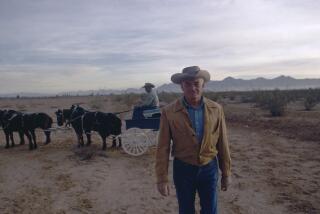Rockmount Ranch Wear Ropes In Clients by Bucking Retail Trendiness
- Share via
DENVER — Jack A. Weil is a baron of the West.
Instead of running a vast cattle ranch, Weil runs his empire from a five-story, careworn brick building in trendy lower downtown, surrounded by upscale restaurants and nightclubs.
For nearly 50 years, the founder of Rockmount Ranch Wear has manufactured clothing emblematic of the Old West, including the first shirt that closed with snaps and bolo ties.
On a gray spring day, Weil, his son and grandson, all Rockmount executives, bickered playfully in an office covered in material swatches, ties, silver, hats and the famous snap shirt. Celebrity photos, saddles and vintage Rockmount gear line the walls.
As they stood together, three generations of Western design stood with them--Jack A. Weil with his traditional plaid saw-toothed shirt, son Jack B. Weil in a brownish rough cotton shirt with “smile” pockets, and grandson Steve with embroidery around his sea-green shirt.
Jack A. Weil, who turned 100 Wednesday, leaned back in his chair, wearing a plaid rayon shirt with diamond-shaped snaps, a silver-dollar bolo tie that dates to the year he was born, and cowboy boots.
His wrinkled hands tugged at his cowboy hat as he summed up Rockmount’s history. “People want to wear something unique. And we provide it,” said Weil. “The idea never ages.”
His traditional clothing line has remained a consistent seller, despite newer design trends, said Mark Nowlen, who owns three Western stores, one each in Texas, Florida and Colorado.
“Their product has stayed true to Western fashion when other Western companies went for trends,” he said.
Born in Evansville, Ind., Jack A. Weil started his career in 1928 as a salesman, peddling men’s garters and other latex products. He opted for a territory that stretched from El Paso to the Canadian border.
He arrived in Denver in the 1930s in a Chrysler Roadster, and soon began helping his friend Phil Miller, who owned Miller-Stockman, sell cowboy hats. Miller persuaded Weil to market and design shirts.
“I learned fast you can’t sell to cowboys; they have no money. You have to appeal to the cowboy in everyone and sell to them,” he said.
After World War II, Weil bought metal snap buttons to add to his signature shirts.
“People ask me why I never patented any of these things. Well, when I created them, a patent wasn’t worth anything unless you spent millions of dollars in court,” Weil said. “And people know our merchandise is the real thing. That’s why they buy it.”
Today, his privately owned company has 200 employees, with five factories scattered throughout the United States. The company sells shirts, bolo ties and hats to about 1,500 retailers around the world.
“We just started carrying their shirts a few weeks ago,” said Kristine Dellavechio, who works at Sunneshine, a swanky Boulder, Colo., boutique. “The cowboy look is in again, and the shirts sell pretty well considering we don’t sell anything else like it.”
The Weils believe they have created a true American style, offering shirts in different materials and patterns, even a Hawaiian print.
Their traditional cotton diamond-snap shirt with saw-toothed pockets has the same impact on Western-wear shirt consumers as do Levi’s 501s on would-be cowboy jeans’ buyers, said Steve Weil, who oversees designing and marketing. Their shirts have been worn by Dennis Quaid, Jodie Foster and Bruce Springsteen.
Steve Weil said Robert Redford specifically requested Rockmount shirts for the movie, “The Horse Whisperer.”
The price of a shirt has gone from about $2 in the 1940s to more than $55 today, mostly because the Weils refuse to manufacture overseas.
Business is steady, but the Weils decline to specify sales figures. “More companies are selling lower-quality clothing, and we don’t. It really helps to do things right,” Steve Weil said.
Rockmount remains the only wholesale clothing company in downtown Denver.
Because costs have increased, Steve Weil recently decided to rent one floor as office space and put a garage in the basement.
“We started right here because my grandfather loves this city, and we’ll stay here because that’s where our history is,” Steve Weil said.






